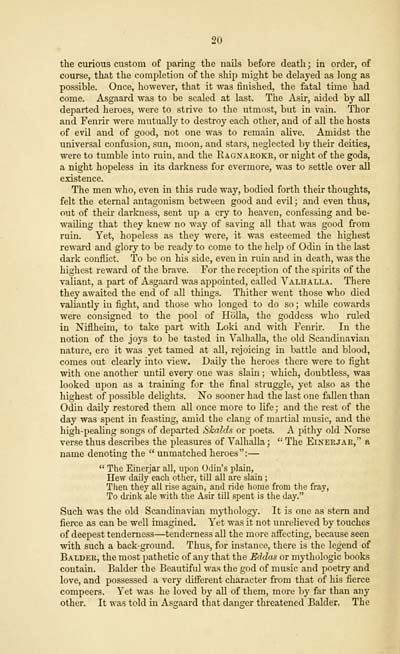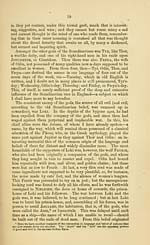Download files
Complete book:
Individual page:
Thumbnail gallery: Grid view | List view

20
the curious custom of paring the nails before death ; in order, of
course, that the completion of the ship might be delayed as long as
possible. Once, however, that it was finished, the fatal time had
come. Asgaard was to be scaled at last. The Asir, aided by all
departed heroes, were to strive to the utmost, but in vain. Thor
and Fenrir were mutually to destroy each other, and of all the hosts
of evil and of good, not one was to remain alive. Amidst the
universal confusion, sun, moon, and .stars, neglected by their deities,
were to tumble into ruin, and the Ragxarokr, or night of the gods,
a night hopeless in its darkness for evermore, was to settle over all
existence.
The men who, even in this rude way, bodied forth their thoughts,
felt the eternal antagonism between good and evil ; and even thus,
out of their darkness, sent up a cry to heaven, confessing and be-
waUing that they knew no way of saving all that was good from
ruin. Yet, hopeless as they were, it was esteemed the highest
reward and glory to be ready to come to the help of Odin in the last
dark conflict. To be on his side, even in ruin and in death, was the
highest reward of the brave. For the reception of the spirits of the
valiant, a part of Asgaard was appointed, called Valhalla. There
they awaited the end of aU things. Thither went those who died
valiantly in fight, and those who longed to do so ; whUe cowards
were consigned to the pool of HiiUa, the goddess who ruled
in Niflheim, to take part with Loki and with Fenrir. In the
notion of the joys to be tasted in Valhalla, the old Scandinavian
nature, ere it was yet tamed at all, rejoicing in battle and blood,
comes out clearly into view. Daily the heroes there were to fight
with one another until every one was slain ; which, doubtless, was
looked upon as a training for the final struggle, yet also as the
highest of possible delights. No sooner had the last one fallen than
Odin daily restored them all once more to life; and the rest of the
day was spent in feasting, amid the clang of martial music, and the
high-peaUng songs of departed Skalds or poets. A pithy old Norse
verse thus describes the pleasures of Valhalla; '•' The Einerjar," a
name denoting the " unmatched heroes": —
" The Einerjar all, upon Odin's plain,
Hew daily each other, till all are slain ;
Then they all rise again, and ride home from the fray,
To drink ale with the Asir till spent is the day."
Such was the old Scandinavian mythology. It is one as stem and
fierce as can be well imagined. Yet was it not unrelieved by touches
of deepest tenderness — tenderness all the more affecting, because seen
with such a back-ground. Thus, for instance, there is the legend of
Balder, the most pathetic of any that the Eddas or mythologic books
contain. Balder the Beautiful was the god of music and poetry and
love, and possessed a very different character from that of his fierce
compeers. Yet was he loved by all of them, more by far than any
other. It was told in Asgaard that danger threatened Balder. The
the curious custom of paring the nails before death ; in order, of
course, that the completion of the ship might be delayed as long as
possible. Once, however, that it was finished, the fatal time had
come. Asgaard was to be scaled at last. The Asir, aided by all
departed heroes, were to strive to the utmost, but in vain. Thor
and Fenrir were mutually to destroy each other, and of all the hosts
of evil and of good, not one was to remain alive. Amidst the
universal confusion, sun, moon, and .stars, neglected by their deities,
were to tumble into ruin, and the Ragxarokr, or night of the gods,
a night hopeless in its darkness for evermore, was to settle over all
existence.
The men who, even in this rude way, bodied forth their thoughts,
felt the eternal antagonism between good and evil ; and even thus,
out of their darkness, sent up a cry to heaven, confessing and be-
waUing that they knew no way of saving all that was good from
ruin. Yet, hopeless as they were, it was esteemed the highest
reward and glory to be ready to come to the help of Odin in the last
dark conflict. To be on his side, even in ruin and in death, was the
highest reward of the brave. For the reception of the spirits of the
valiant, a part of Asgaard was appointed, called Valhalla. There
they awaited the end of aU things. Thither went those who died
valiantly in fight, and those who longed to do so ; whUe cowards
were consigned to the pool of HiiUa, the goddess who ruled
in Niflheim, to take part with Loki and with Fenrir. In the
notion of the joys to be tasted in Valhalla, the old Scandinavian
nature, ere it was yet tamed at all, rejoicing in battle and blood,
comes out clearly into view. Daily the heroes there were to fight
with one another until every one was slain ; which, doubtless, was
looked upon as a training for the final struggle, yet also as the
highest of possible delights. No sooner had the last one fallen than
Odin daily restored them all once more to life; and the rest of the
day was spent in feasting, amid the clang of martial music, and the
high-peaUng songs of departed Skalds or poets. A pithy old Norse
verse thus describes the pleasures of Valhalla; '•' The Einerjar," a
name denoting the " unmatched heroes": —
" The Einerjar all, upon Odin's plain,
Hew daily each other, till all are slain ;
Then they all rise again, and ride home from the fray,
To drink ale with the Asir till spent is the day."
Such was the old Scandinavian mythology. It is one as stem and
fierce as can be well imagined. Yet was it not unrelieved by touches
of deepest tenderness — tenderness all the more affecting, because seen
with such a back-ground. Thus, for instance, there is the legend of
Balder, the most pathetic of any that the Eddas or mythologic books
contain. Balder the Beautiful was the god of music and poetry and
love, and possessed a very different character from that of his fierce
compeers. Yet was he loved by all of them, more by far than any
other. It was told in Asgaard that danger threatened Balder. The
Set display mode to: Large image | Transcription
Images and transcriptions on this page, including medium image downloads, may be used under the Creative Commons Attribution 4.0 International Licence unless otherwise stated. ![]()
| Early Gaelic Book Collections > J. F. Campbell Collection > Our Scandinavian forefathers > (26) |
|---|
| Permanent URL | https://digital.nls.uk/81096303 |
|---|
| Description | Volumes from a collection of 610 books rich in Highland folklore, Ossianic literature and other Celtic subjects. Many of the books annotated by John Francis Campbell of Islay, who assembled the collection. |
|---|
| Description | Selected items from five 'Special and Named Printed Collections'. Includes books in Gaelic and other Celtic languages, works about the Gaels, their languages, literature, culture and history. |
|---|

